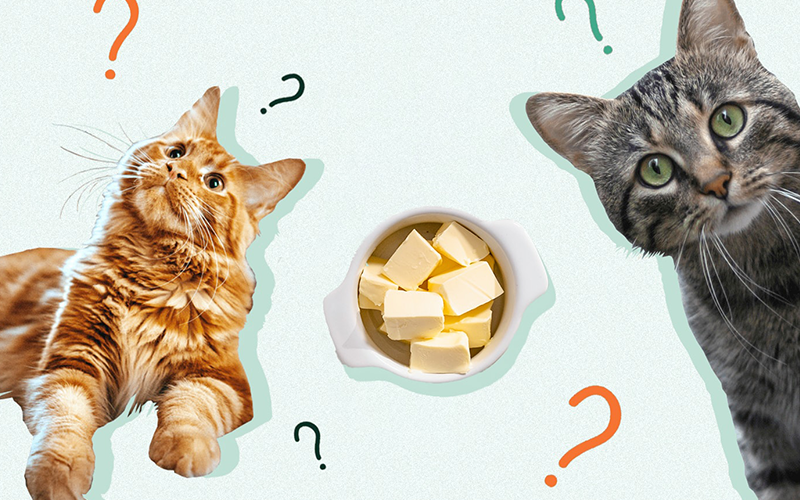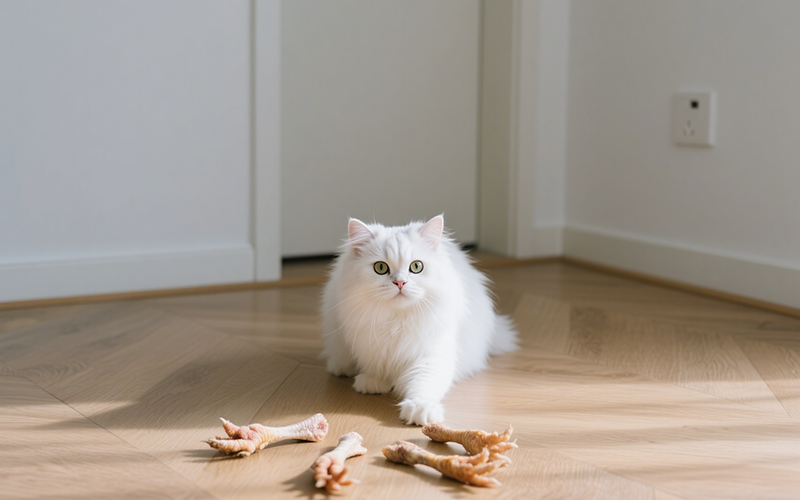Can Cats Eat Butter? Exploring the Risks and Benefits for Your Feline Friend
- 27 Feb 2025 14:41
As a cat owner, you may be curious about whether certain human foods, like butter, are safe for your feline companion. While it might be tempting to share a small piece of butter with your cat, it's important to understand how it can affect their health. In this article, we’ll explore whether butter is safe for cats, its potential health benefits and risks, and what you should know before offering it to your pet.

The Nutritional Needs of Cats
Cats are obligate carnivores, meaning they rely on animal-based protein to meet their nutritional needs. They require a balanced diet that consists of proteins, fats, vitamins, and minerals found in meat. Unlike humans and omnivores, cats cannot synthesize certain nutrients, such as taurine and vitamin A, from plant sources, so it is crucial to provide them with food that meets these requirements.
When it comes to feeding your cat, it’s important to offer food that aligns with their nutritional needs. While certain human foods might seem like a good treat, they often contain ingredients that aren't suitable for cats.
Can Cats Eat Butter?
In small amounts, butter is not toxic to cats, but it is not an ideal or healthy food for them. Butter is made from cream and is high in fat, which is not inherently harmful, but it does not provide any nutritional benefits for your cat. Here's a breakdown of the key factors to consider before feeding butter to your cat:
High Fat Content: Butter is made up primarily of fat, which can be difficult for cats to process in large quantities. Cats don’t need as much fat in their diet as other animals, and excess fat can contribute to obesity and other health issues, such as pancreatitis or digestive upset.
Lactose: While some cats may tolerate small amounts of dairy, many cats are lactose intolerant. This means they lack the enzyme necessary to properly digest lactose, the sugar found in milk and dairy products. Feeding butter to a lactose-intolerant cat can lead to symptoms like diarrhea, stomach cramps, and gas.
No Nutritional Value: While butter may taste good to your cat, it doesn’t offer any essential nutrients like protein or vitamins. Cats require specific nutrients to thrive, such as taurine, vitamin A, and arachidonic acid, which they can only get from animal-based proteins. Butter doesn’t provide any of these crucial nutrients, making it an unnecessary addition to your cat’s diet.
Potential for Overeating: Because butter is high in fat and easy to consume in large quantities, there is a risk of overfeeding your cat if it becomes a regular treat. Over time, this can lead to obesity, which can increase the risk of other health issues like diabetes and joint problems.
Risks of Feeding Butter to Cats
While a small amount of butter is unlikely to cause immediate harm, there are several risks to consider when feeding butter to your cat:
Obesity: Cats that are fed too much butter or other high-fat foods may gain weight. Obesity is a serious health issue in cats, leading to conditions such as diabetes, heart disease, and decreased quality of life.
Digestive Upset: For lactose-intolerant cats, eating butter can lead to gastrointestinal problems such as diarrhea, vomiting, or abdominal pain. Even cats that are not lactose intolerant may experience stomach discomfort if they eat too much butter.
Pancreatitis: Pancreatitis is a condition in which the pancreas becomes inflamed, often due to the consumption of fatty foods. Cats that consume excessive amounts of butter may be at risk of developing this condition, which can cause symptoms like loss of appetite, vomiting, and abdominal pain.
What Are the Alternatives to Butter for Cats?
If you’re looking for ways to treat your cat, there are much healthier and safer options than butter. Here are a few ideas for cat-friendly treats that align with their nutritional needs:
Cooked Meat: Small pieces of cooked chicken, turkey, or beef can be a healthy and enjoyable treat for your cat. Meat is high in protein, which is essential for your cat’s overall health, and it doesn’t contain any unnecessary fat or dairy.
Commercial Cat Treats: There are many commercial cat treats available that are formulated to meet your cat’s nutritional needs. Look for treats made with high-quality animal proteins, such as chicken, salmon, or turkey, that are free from artificial additives and preservatives.
Cat-Specific Dairy Products: If you want to give your cat a dairy treat, consider offering specially formulated cat-friendly dairy products, which are typically lactose-free. These treats can satisfy your cat's desire for dairy without causing digestive upset.
Freeze-Dried Meat Treats: Freeze-dried treats made from single ingredients like chicken, turkey, or fish are another healthy option for cats. These treats provide a natural protein boost and are free from harmful additives.
Signs of Lactose Intolerance in Cats
If your cat has eaten butter or any other dairy product and begins to show signs of digestive distress, it could be a sign of lactose intolerance. Some common symptoms of lactose intolerance in cats include:
Diarrhea
Vomiting
Stomach bloating or discomfort
Flatulence
Lethargy or loss of appetite
If your cat shows any of these symptoms after eating butter, it’s best to avoid feeding them dairy products in the future and consult with your veterinarian for advice.
Conclusion: Can Cats Eat Butter?
In conclusion, while butter is not toxic to cats, it is not a recommended treat due to its high fat content, potential for causing digestive upset, and lack of nutritional value. Cats have specific dietary needs that should be met with high-quality protein sources, and butter does not fulfill these needs. If you want to give your cat a special treat, stick to options that are nutritionally appropriate, such as cooked meat or commercial cat treats.
For ongoing support in caring for your cat, consider using PettureX, an AI-powered pet health software assistant. PettureX offers 24/7 online consultations and advice on pet nutrition and health, making it easier to keep your cat healthy and happy. With PettureX's image recognition and expert guidance, you'll have the tools you need to make informed decisions about your cat’s diet and overall well-being.
Related

Can Cats Eat Egg Yolk Raw? A Vet's In-Depth Guide to Feline Nutrition & Safety
- 10 Jun 2025
Can Cats Eat Dog Kibble? Unpacking the Nutritional Mismatch!
- 29 May 2025
Can Cats Eat Deli Turkey? Slicing Through the Facts for Your Feline!
- 29 May 2025
Can Cats Eat Deer Meat? Exploring Venison for Your Feline!
- 28 May 2025
Can Cats Eat Corned Beef? Unpacking This Salty Human Delicacy!
- 28 May 2025
Can Cats Eat Cooked Rice? The Grain Truth for Your Feline Friend!
- 27 May 2025
Can Cats Eat Cornbread? A Crumb of Truth for Curious Cat Owners!
- 27 May 2025
Can Cats Eat Cooked Meat? Sizzling Facts for Your Feline's Feast!
- 26 May 2025
Can Cats Eat Chili? Spicing Up the Truth About This Human Dish!
- 26 May 2025
Can Cats Eat Chicken Feet? A Paw-sitive or Negative Treat?
- 24 May 2025
